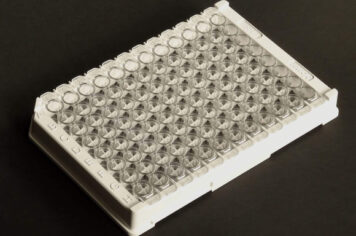Plates for Immunotoxicity
Coated 96-Well Plates for Immunotoxicity ELISA Test are ideal for setting up ELISA IgM and IgG assays to be used as biomarkers of immunotoxicity
Immunotoxicity analysis plays a fundamental role in studying the development of new drugs. In preclinical trials, to assess whether a drug can cause immunosuppression problems to the immune system, animals are immunized with specific antigens such as: KLH (Keyhole Limpet Hemocyanine), SRBC (Sheep Red Blood Cells), Tetanus toxoid, DNP (Dinitrophenol), TNP (Trinitrophenol)...
[Read more]
Dinitrophenol and trinitrophenol are haptens that can be attached to carrier proteins such as KLH (Keyhole Limpet Hemocyanin) or ovoalbumin; when one of this complex is injected into appropriate animal models, produce an immune response which is measured as changes in the levels of anti DNP (or anti TNP) IgM and IgG. Thanks to these changes, the researchers can assess the impact of pharmacologic or genetic manipulations on the studied immune system.
Tetanus, commonly called lockjaw, is a serious bacterial disease that affects muscles and nerves. It is characterized by muscle stiffness that usually involves the jaw and neck that then progresses to involve other parts of the body. This disease is caused by neurotoxin from deep wound infection with Clostridium tetani. The use of this product can find application to set up assays where the level of anti-tetanus toxoid antibodies present in biological samples are measured spectrophotometrically.
Anti-KLH, anti-tetanus toxoid, anti-DNP and anti-TNP IgM and IgG are routinely used as biomarkers of immunotoxicity.
Biomat Coated 96-Well Plates for Immunotoxicology are made in Transparent Polystyrene and can be used for quantitative and qualitative immunoassays like ELISA assays.
Coated Surfaces for Immunotoxicity ELISA Test are pre-blocked in order to minimize any non-specific binding and to ensure long-term stability.
Coated 96-Well Plates for Immunotoxicity main features
Biomat Coated Plates for immunotoxicity are suitable with ELISA Assay Technology due to these features:
- Ready to use
- Manufactured under ISO:9001 guidelines
- Made in pure polystyrene with low fluorescence
- The mould design provides optical quality, important to reduce the background signal
- The wells inner bottom radius edge improves the efficiency of washings
- The external lid warrants vertical alignment when using single microplate wells
- Alphanumeric coding for easy well recognition
- The rim protects the external face of the bottom from scratches
- Microplates comply with SBS standards and the design assures a good performance in automatic processing plant
- Post-coated (blocked) for low non specific binding and long-term stability
- All lots are tested for uniformity and reproducibility
- Certificate of Quality is released for every lot
- For Research Use Only

